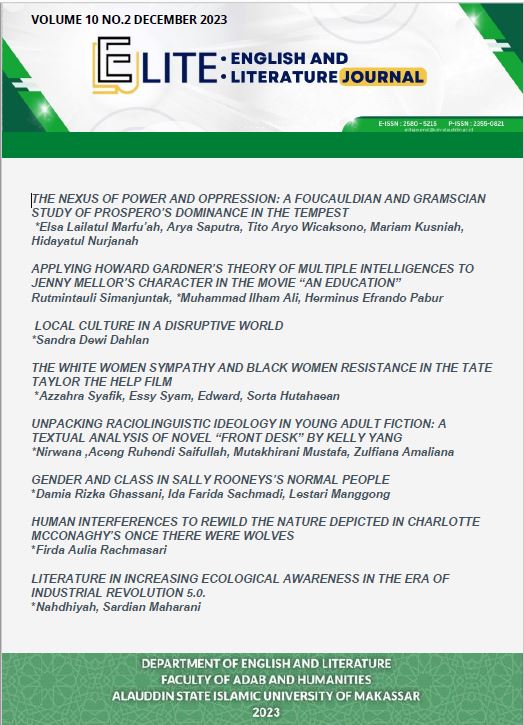UNPACKING RACIOLINGUISTIC IDEOLOGY IN YOUNG ADULT FICTION: A TEXTUAL ANALYSIS OF NOVEL “FRONT DESK” BY KELLY YANG
Abstrak
Penelitian ini mengkaji representasi ideologi rasiolinguistik dewasa muda, dengan fokus khusus pada novel "Front Desk" karya Kelly Yang. Novel yang diterbitkan pada tahun 2018 ini berfungsi sebagai prisma untuk meneliti interaksi antara ras dan bahasa. Ideologi rasiolinguistik, seperti yang dijelaskan oleh Rosa dan Flores, berkaitan dengan interaksi yang kompleks antara ras dan bahasa dan bagaimana hal tersebut secara aktif digunakan untuk membangun dan melanggengkan hierarki dan ketidaksetaraan sosial. Penelitian ini akan menggunakan analisis tekstual untuk menemukan dan memeriksa mekanisme linguistik dan naratif yang digunakan dalam "Front Desk" untuk mengekspresikan dan menginterogasi ideologi rasiolinguistik ini. Hasil analisis tekstual mengungkapkan teknik linguistik unik yang digunakan dalam "Front Desk," yang memberikan gambaran tentang bagaimana para karakter menavigasi dan menegosiasikan bahasa sehubungan dengan identitas rasial mereka. Penggambaran narasi novel ini secara diam-diam membentuk dan melanggengkan hirarki rasial, memberikan wawasan yang bernuansa tentang bagaimana bahasa berkontribusi pada konstruksi sosial ini. Penelitian ini memperjelas penggambaran novel tersebut tentang perkembangan praktik bahasa individu dalam kaitannya dengan identitas ras mereka melalui pemeriksaan perkembangan karakter, memberikan pemahaman yang lebih
##plugins.generic.usageStats.downloads##
Referensi
Azhar, I. N. (2022). US Raciolinguistics Heated Discourses: Can They be Brought to Indonesia? Prosodi, 16(1), 1–16. https://doi.org/10.21107/prosodi.v16i1.13410
Barrett, R., Cramer, J., & McGowan, K. B. (2022). English with an Accent. English with an Accent. https://doi.org/10.4324/9781003332886
Bauler, C. (2023). Have We Learned Anything ? Raciolinguistic Ideologies in Remote Learning Public Discourses. 1(1).
Bean, T. W., & Moni, K. (2003). Developing students’ critical literacy: Exploring identity construction in young adult fiction. Journal of Adolescent and Adult Literacy, 46(8), 638–648.
Cushing, I. (2023). Raciolinguistic policy assemblages and white supremacy in teacher education. Curriculum Journal, 34(1), 43–61. https://doi.org/10.1002/curj.173
Cushing, I., & Carter, A. (2022). Using young adult fiction to interrogate raciolinguistic ideologies in schools. Literacy, 56(2), 106–119. https://doi.org/10.1111/lit.12277
Edward Arnold. Yang, K. (2018). Front Desk. Scholastic Press. Rosa, J. & Flores, N. (2017). Unsettling race and language: Toward a raciolinguistic perspective. Language in Society, 46
Flores, N., & Rosa, J. (2015). Undoing appropriateness: Racioling uistic ideologies and language diversity in education. Harvard Educational Review, 85(2), 149–171. https://doi.org/10.17763/0017-8055.85.2.149
Garcia, A. (2013). Critical foundations in young adult literature: Challenging genres (Vol. 4). Sense Publishers
Hess, D. E. (2009). Controversy in the classroom: The democratic power of discussion. Routledge.
Knickerbocker, J. L. (2017). Literature for young adults: Books (and more) for contemporary readers. Taylor & Francis.
MA, K. L. N. (2018). CHANGING NAMES, CHAN GING PLACES: THE TRANSFORMATION OF FEMALE IDENTITY THROUGH TRANSLOCATION IN FOUR NOVELS BY BHARATI MUKHERJEE (Doctoral dissertation, The University of Fiji).
McGill, B. M., Foster, M. J., Pruitt, A. N., Thomas, S. G., Arsenault, E. R., Hanschu, J., … Burgin, A. J. (2021). You are welcome here: A practical guide to diversity, equity, and inclusion for undergraduates embarking on an ecological research experience. Ecology and Evolution, 11(8), 3636–3645. https://doi.org/10.1002/ece3.7321
Mcnair, T. I. A. B. (n.d.). Equity Talk to Equity Walk - Tia McNair PowerPoint.
Naji Meidani, E., & Pishghadam, R. (2012). Analysis of English language textbooks in the light of English as an International Language (EIL): A comparative study. International Journal of Research Studies in Language Learning, 2(2). https://doi.org/10.5861/ijrsll.2012.163
Palinkas, L. A., Horwitz, S. M., Green, C. A., Wisdom, J. P., Duan, N., & Hoagwood, K. (2015). Purposeful Sampling for Qualitative Data Collection and Analysis in Mixed Method Implementation Research. Administration and Policy in Mental Health and Mental Health Services Research, 42(5), 533–544
Pino, J. Del. (2022). Raciolinguistics Through a Historical, Global, and Intersectionality Lens. CATESOL Journal, 33(1), 1–14. Retrieved from https://search.ebscohost.com/login.aspx?direct=true&db=eax&AN=161381702&site=ehost-live
Ramjattan, V. A. (2023). International students and their raciolinguistic sensemaking of aural employability in Canadian universities. International Journal of the Sociology of Language, 2023(282), 159–180. https://doi.org/10.1515/ijsl-2022-0067
Rickford, J. R., & Ball, A. F. (2016). Raciolinguistics: How language shapes our ideas about race. Oxford University Press. Thompson, G. (2014). Introducing functional grammar. Routledge.
Rosa, J., & Flores, N. (2023). Rethinking Language Barriers & Social Justice from a Raciolinguistic Perspective. Daedalus, 152(3), 99–114. https://doi.org/10.1162/daed_a_02020
Rosa, J., & Flores, N. (2017). Unsettling race and language: Toward a raciolinguistic perspective. Language in Society, 46(5), 621-647. doi:10.1017/S0047404517
Subtirelu, N. C. (2020). Raciolinguistic ideology, the Seal of Biliteracy, and the politics of language education. The Seal of Biliteracy: Case studies and considerations for policy implementation, 161-176.
Sun, W., & Wang, X. (2023). A raciolinguistic analysis of the neoliberal promotion of dual language education in a new Latinx South state. Discourse, 44(1), 61–75. https://doi.org/10.1080/01596306.2021.1955242
Taxel, J. (1997). Multicultural literature and the politics of reaction. Teachers College Record, 98(3), 417-448.
Yoshimi, J. (2016). Textual Analysis. SpringerBriefs in Philosophy, 35–37. https://doi.org/10.1007/978-3-319-26698-5_4
##submission.copyrightStatement##
##submission.license.cc.by-nc-sa4.footer##Once an article was published in the journal, the author(s) are:
granted to the journal right licensed under Creative Commons License Attribution that allows others to share the work with an acknowledgement of the work's authorship.
permitted to publish their work online in third parties as it can lead wider dissemination of the work.
continue to be the copyright owner and allow the journal to publish the article with the CC BY-NC-SA 4.0 license
receiving a DOI (Digital Object Identifier) of the work.


